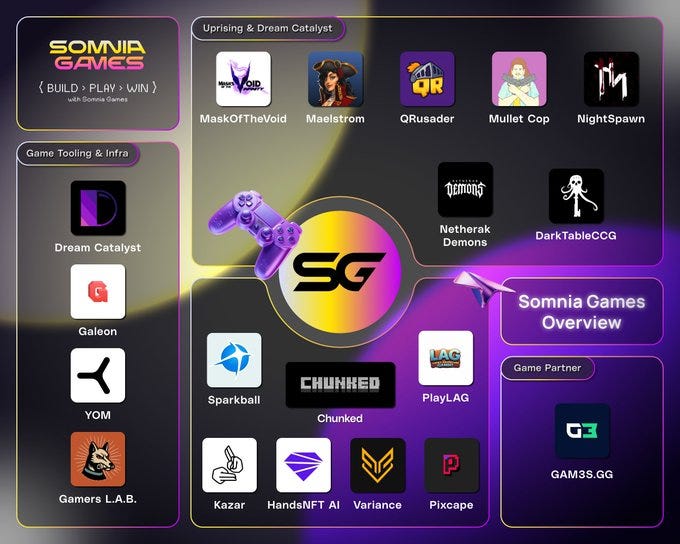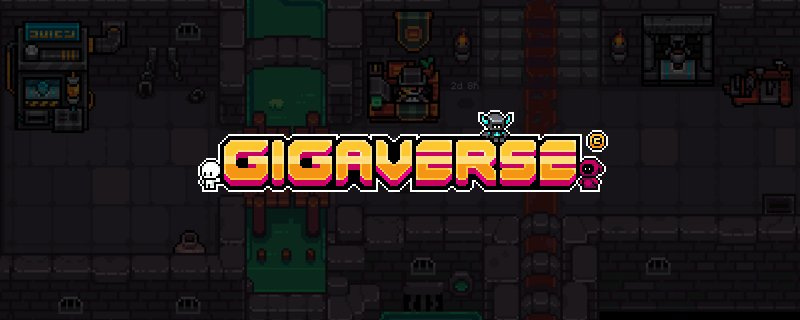Hackers break MapleStory Universe, is this the end?
GC ALPHA 53
Disclaimer: None of this information should be taken as financial advice. DYOR + I will hold some of the assets mentioned in this newsletter.
Somnia continues to expand its library with new games and has announced its partnership with Variance (make sure to start collecting tickets).
This is Somnia Games:
Sponsored by Somnia.
P2A & P2E EVENTS + SOCIALFI
Off the Grid introduces a new “Anti-Cheat” Battlepass update\
FIFA Rivals has officially launched (surpassed 100K downloads so far)
My Neighbour Alice partnered with Pudgy Penguins for its official release
Legends of Arcadia S3 is officially live (on Ronin and Base)
Sleepagotchi x Pixels event is now live with 500,000 $PIXELS on the line
AVAX introduced the Avalanche Battlepass (NFT rewards + game perks)
MARKET TALK
HACKERS BREAK MAPLESTORY UNIVERSE
Only about a month after the release of NXPC, hackers managed to break MapleStory Universe. A concerning issue with serious implications for the in-game economy…
Apple reported the issue 5 days ago, stating that a player solo’d a boss, received the rewards, and converted NOSO to NXPC afterwards. However, according to the player data, the boss is “absolutely impossible to solo”
It’s also an accomplishment that normally requires “tens of thousands of dollars” and many hours of gameplay. Therefore, undermining the players who put in the time and money into the game
The hacking started small, by selling Ranger characters for pennies on the market, and has escalated to farming end-game bosses using god mode
Luckily, the MSU team reacted quickly, rolling out a patch in which boss rewards are no longer instantly claimable anymore. A smarter detection system and an ongoing defense system enhancement
Pygo mentioned that the servers are looking better (for) now…
Not only has Apple reported this problem, but various players have complained about its impact on the game:
Sizer, an MSU guild based in China, reported a “rampant problem of cheaters”. Plus, detailing that open-world maps are being invaded by them, affecting the dungeons (and so item drops)
Game studios have to stay ahead of hackers in Web2 (MSU knows this very well, because of the original game), and it is a constant battle of catch-up. And when assets have real money value, this problem is only exacerbated...
If the incentive is there, people will try to break and exploit your systems (en masse). And unfortunately, the only way to fully eradicate economy-breaking cheating is to remove the incentives
Therefore, mitigation is the only option, and you need to implement systems such as randomizing the reward output (e.g., gacha) or requiring a (significant) $ investment to “extract”
MSU’s update might resolve some of its issues now, however, it won’t for long. Hopefully, it can manage to stay ahead of the exploiters, or else more players will start to divest from the game quickly
111 DAYS OF GIGAVERSE
A couple of days ago, Dith shared an article named: “111 days of Gigaverse”. An insightful reflection on building out an onchain game. Let’s get into the highlights:
Stats: 73,500 players created an account (access was initially gated at ~$10), 40,000 peak WAU, 27.500 Juice Buys, 1.5M item sales, and $1.5M in revenue over 3 months
The $1.5M excludes revenue from ROMs and is driven by Giga Juice and sign-ups. Juice is the in-game power-up, or VIP subscription. It is purchasable in 4 different durations
Over a month ago, Hunter pointed out how Abstract’s XP and Badge system drove sales of Giga Juice. Reason: users expect the XP reward to be higher than their “investment”
The Gigaverse ROM mint generated another 10,000 x $150 ($1.5M) when they minted back in March
1.5M item sales include 140,000 in unique trades and $250,000 in trading volume
48 hours after it went live, the game already did 15x the trading volume that they have on Magic Eden. Proving that the more embedded a marketplace is, the higher the conversion rate
The game has shipped a good amount of features to date: crafting, the marketplace, gear system, a new dungeon, incentivized referrals, giga juice, and a bunch of QoL improvements
To me, it was reminiscent of Uncharted’s scrappy approach: start with a fun core loop (rock, paper, scissors) → find PMF → scale up (through content)
Build fast, fail quickly, iterate fast
Fishing was introduced most recently and adds a new game to the core game loop. Plus, Dith mentions that there will be “many different gameplay loops in Gigaverse”, requiring different skills and thinking
The vision is to grow into a large social MMO (again, similar to how Fishing Frenzy is being built)
Remarkably, $0 was paid to KOLs or agencies, and they have been able to establish their core community in the early days themselves
Seemingly, a combination of the foundations they built in the GL:HF community, excellent founder-first marketing, and ultimately returning value to your holders
“Believers in our creativity & capability to deliver long-lasting value to ROMs are important to us”
Furthermore, Gigaverse positions itself as “a universe of universes”: through its open API (resulting: in-game agents), being open to partner integrations, and a lean and agile approach
Overall, Gigaverse makes for a great case study for how to kickstart a game made for the crypto audience. And I see many similarities in the builder philosophy, not only in Fishing Frenzy, but also in Cambria
ON THE RISE
Slime Miner surpassed 13M players and $2M in in-game revenue
Uprising shares its tokenomics: 37% of the supply is going to the community










